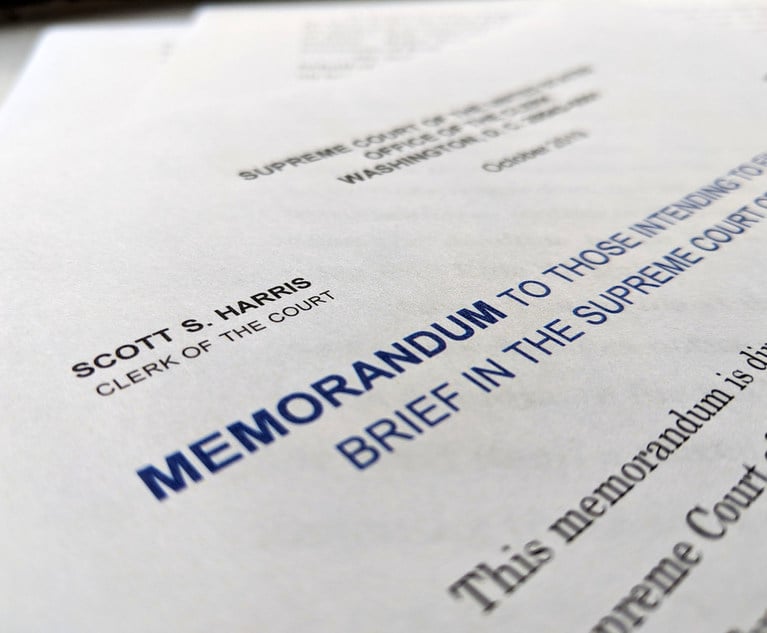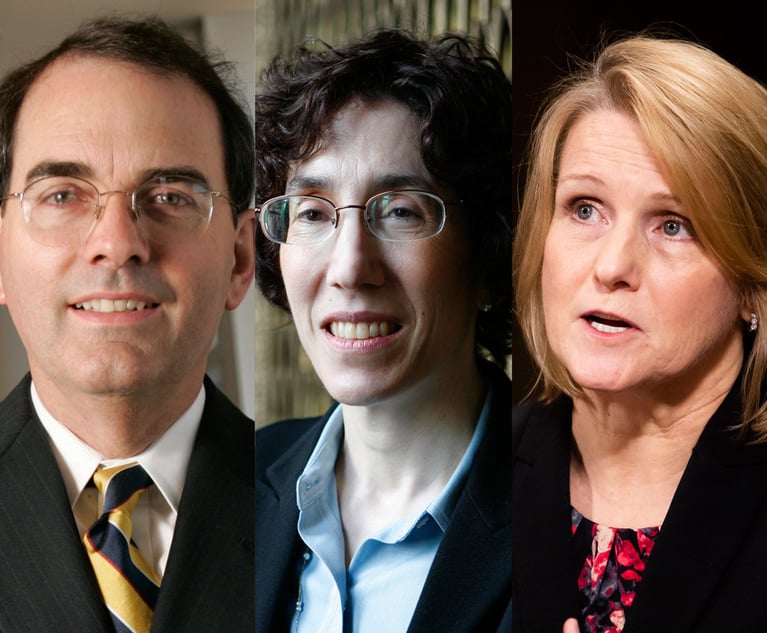DC Circuit Rejects CFPB Subpoena Targeting For-Profit College Accreditor
A Washington federal appeals court on Friday rejected the Consumer Financial Protection Bureau's attempt to investigate an embattled accreditor of for-profit colleges, upholding a trial judge's ruling that faulted the Obama-era agency for straying outside its jurisdiction.
April 22, 2017 at 12:14 AM
11 minute read
A Washington federal appeals court on Friday rejected the Consumer Financial Protection Bureau's attempt to investigate an embattled accreditor of for-profit colleges, upholding a trial judge's ruling that faulted the Obama-era agency for straying outside its jurisdiction.
In a unanimous ruling, a three-judge panel of the U.S. Court of Appeals for the D.C. Circuit said the CFPB's subpoena—targeting the Accrediting Council of Independent Colleges and Schools—was overly vague. The appeals court did not take a position on whether a more narrowly tailored subpoena would be enforced.
The agency issued the administrative subpoena—known as a civil investigative demand—in August 2015 to the accrediting agency, a Washington-based organization that reviews schools for federal student aid funding. The U.S. Department of Education has since stripped the council's power to review schools.
The CFPB asked the accrediting council to identify the schools it had accredited since January 2010 and name a representative to testify on the accreditations of seven specific colleges. The CFPB said it wanted “to determine whether any entity or person has engaged or is engaging in unlawful acts and practices in connection with accrediting for-profit colleges.”
Writing for the D.C. Circuit panel, Judge David Sentelle said the CFPB's subpoena “never explains what the broad and non-specific term 'unlawful acts and practices' means in this investigation. Tellingly, in attempting to explain the scope of its investigation, the bureau merely repeats the broad language used in the notification of purpose.”

Photo: Diego M. Radzinschi/ALM
Asked how the CFPB would respond to the decision, a spokesman gave no clear indication of whether the agency would appeal or draft a new subpoena addressing the court ruling.
“We have the court's decision and understand it, and we will make careful efforts to conform to the ruling in our further investigations, whether in this case or any other case,” CFPB Director Richard Cordray said in a statement.
Venable partner Allyson Baker, a former CFPB enforcement lawyer, represented the accrediting council. Venable said Friday's decision was the “first time in decades that a federal appeals court has struck down an administrative subpoena issued by the federal government.”
Sentelle heard the case with Judges Karen LeCraft Henderson and Robert Wilkins. At oral argument in February, Sentelle was particularly critical of the CFPB. Sentelle at one point dressed down CFPB attorney Lawrence DeMille-Wagman after he appeared to talk over the judge. When Sentelle asked whether a college accreditor could be considered a “covered person” subject to the CFPB's enforcement authority, Sentelle answered his own question: “No. No, OK. The answer would be 'no,'” he said.
DeMille-Wagman defended the subpoena, arguing that the agency's investigative demands are not limited only to those potentially subject to an enforcement action. “The bureau,” he said, “has authority to obtain information from those who have it” regarding a potential violation of the law.
The D.C. Circuit's panel decision on Friday upheld an April 2016 ruling by U.S. District Judge Richard Leon of the District of Columbia, but it did so on narrow grounds and with a softer tone. “Although it is understandable that new agencies like the CFPB will struggle to establish the exact parameters of their authority, they must be especially prudent before choosing to plow [headlong] into fields not clearly ceded to them by Congress,” Leon wrote then.
Sentelle said the panel was faced with a single question: “Did the CFPB have the statutory authority to issue the CID in question?”
“Because we can easily answer the issue on a narrower basis, and because the invalidity of the CID makes it unnecessary to reach the broad determination of the bureau's authority to investigate the area of accreditation at all, we will not reach the broad question answered by the district court,” he wrote.
In a footnote, the D.C. Circuit panel left open the possibility that the CFPB could craft a more specific subpoena that might pass judicial review. “We express no opinion as to whether a revised CID” should be enforced, the panel wrote.
Since Leon's ruling last year, the CFPB has turned to the courts several times to enforce administrative subpoenas. A federal district judge in Detroit in February ordered Harbour Portfolio Advisors—an investment firm that purchased foreclosed properties in bulk and resold them through high-interest installment contracts known as “contracts for deed”—to comply with a CFPB subpoena.
The CFPB has cited that opinion in Philadelphia federal court as it fights to enforce a separate subpoena issued to the financial services company J.G. Wentworth LLC.
This content has been archived. It is available through our partners, LexisNexis® and Bloomberg Law.
To view this content, please continue to their sites.
Not a Lexis Subscriber?
Subscribe Now
Not a Bloomberg Law Subscriber?
Subscribe Now
NOT FOR REPRINT
© 2024 ALM Global, LLC, All Rights Reserved. Request academic re-use from www.copyright.com. All other uses, submit a request to [email protected]. For more information visit Asset & Logo Licensing.
You Might Like
View All
Divided 5th Circuit Shoots Down Nasdaq Diversity Rules

Nevada Supreme Court to Decide Fate of Groundbreaking Contingency Cap Ballot Measure
5 minute read
Lawyers, Law Groups Oppose Proposal to Require Court Approval for Amicus Briefs

9th Circuit Judges Weigh if Section 230 Shields Grindr From Defective Design Claims
Trending Stories
Who Got The Work
Michael G. Bongiorno, Andrew Scott Dulberg and Elizabeth E. Driscoll from Wilmer Cutler Pickering Hale and Dorr have stepped in to represent Symbotic Inc., an A.I.-enabled technology platform that focuses on increasing supply chain efficiency, and other defendants in a pending shareholder derivative lawsuit. The case, filed Oct. 2 in Massachusetts District Court by the Brown Law Firm on behalf of Stephen Austen, accuses certain officers and directors of misleading investors in regard to Symbotic's potential for margin growth by failing to disclose that the company was not equipped to timely deploy its systems or manage expenses through project delays. The case, assigned to U.S. District Judge Nathaniel M. Gorton, is 1:24-cv-12522, Austen v. Cohen et al.
Who Got The Work
Edmund Polubinski and Marie Killmond of Davis Polk & Wardwell have entered appearances for data platform software development company MongoDB and other defendants in a pending shareholder derivative lawsuit. The action, filed Oct. 7 in New York Southern District Court by the Brown Law Firm, accuses the company's directors and/or officers of falsely expressing confidence in the company’s restructuring of its sales incentive plan and downplaying the severity of decreases in its upfront commitments. The case is 1:24-cv-07594, Roy v. Ittycheria et al.
Who Got The Work
Amy O. Bruchs and Kurt F. Ellison of Michael Best & Friedrich have entered appearances for Epic Systems Corp. in a pending employment discrimination lawsuit. The suit was filed Sept. 7 in Wisconsin Western District Court by Levine Eisberner LLC and Siri & Glimstad on behalf of a project manager who claims that he was wrongfully terminated after applying for a religious exemption to the defendant's COVID-19 vaccine mandate. The case, assigned to U.S. Magistrate Judge Anita Marie Boor, is 3:24-cv-00630, Secker, Nathan v. Epic Systems Corporation.
Who Got The Work
David X. Sullivan, Thomas J. Finn and Gregory A. Hall from McCarter & English have entered appearances for Sunrun Installation Services in a pending civil rights lawsuit. The complaint was filed Sept. 4 in Connecticut District Court by attorney Robert M. Berke on behalf of former employee George Edward Steins, who was arrested and charged with employing an unregistered home improvement salesperson. The complaint alleges that had Sunrun informed the Connecticut Department of Consumer Protection that the plaintiff's employment had ended in 2017 and that he no longer held Sunrun's home improvement contractor license, he would not have been hit with charges, which were dismissed in May 2024. The case, assigned to U.S. District Judge Jeffrey A. Meyer, is 3:24-cv-01423, Steins v. Sunrun, Inc. et al.
Who Got The Work
Greenberg Traurig shareholder Joshua L. Raskin has entered an appearance for boohoo.com UK Ltd. in a pending patent infringement lawsuit. The suit, filed Sept. 3 in Texas Eastern District Court by Rozier Hardt McDonough on behalf of Alto Dynamics, asserts five patents related to an online shopping platform. The case, assigned to U.S. District Judge Rodney Gilstrap, is 2:24-cv-00719, Alto Dynamics, LLC v. boohoo.com UK Limited.
Featured Firms
Law Offices of Gary Martin Hays & Associates, P.C.
(470) 294-1674
Law Offices of Mark E. Salomone
(857) 444-6468
Smith & Hassler
(713) 739-1250










